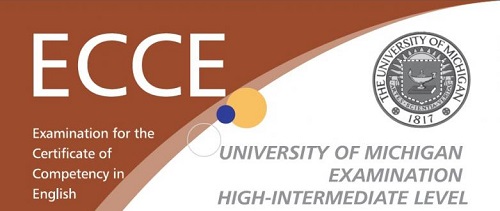

Examination for the Certificate of Competency in English (ECCE)
Naief Khatri

The ECCE Certificate (Examination for the Certificate of Competency in English) was developed by the University of Michigan and the Hellenic American Union in 1992. It is a certification exam of knowledge in English and is awarded by the University of Michigan, which is a well-known American university in the field of linguistic research. The result has lifetime validity.
Who is the exam for?
This ECCE certificate can be used as proof of your knowledge in English for purposes that may be personal, educational, occupational and public. It can be used to show employers your fluency in the English language when applying for jobs or promotions. The ECCE test stands at the B2 level of the Common European Framework of Reference (CEFR).
ECCE Eligibility criteria
This exam is aimed at students who need certification in their ability and skill in reading, speaking, writing and listening in English. It is a more general rather than academic test. It is taken by those who are new to English, and can be taken at a level for those who have already attained a high fluency of English. This exam satisfies the English requirement for many institutes in Australia, Canada, France, New Zealand, U.K. and the U.S. It can also enhance employability in several corporate organizations and aid in an immigration visa for the U.K.
ECCE Exam pattern
The ECCE exam is divided into four categories, three of which are written, and one which is oral. The written sections are Listening, GVR (Grammar, Vocabulary and Reading) and Writing. The oral section is Speaking. The first three sections are conducted on the same day, while the Listening section can be before, after, or on the same day of the written exam.
The total duration is three hours. The section on Speaking is fifteen minutes long and a structured oral interaction takes place between the candidate and this section’s examiner. Visual prompting is involved in this interaction. There are four stages for this part. The section on Listening is half an hour long and is split into two parts. The first part has multiple choice questions which must be answered based on short recorded conversations, and the choices are shown as pictures. There will be thirty such questions. The second part consists of twenty short extended talks on four topics, and each of them are followed by four to six questions.
The Writing section takes half an hour, and in this segment, a short excerpt from a memo, newspaper or letter is chosen as a topic for the test taker to write on, and the candidate can choose whether to write a letter or essay.
The GVR section consists of Grammar, Vocabulary and Reading. All three are multiple choice sections. In the Grammar segment, an incomplete sentence is presented, and the test taker has to choose the correct answer from a choice of words or phrases. In the Vocabulary section, a similar pattern as that of the Grammar section is followed. There are thirty-five questions each for the two sections.
The Reading segment is split into three parts, first which is a short exercise on reading comprehension, the second part involves advertisements with questions which follow it, and the last is a set of longer passages with comprehension questions following it. There are thirty questions for this section as well.
Scoring method
The four sections of the ECCE are scored using Item Response Theory (IRT). The IRT scoring can provide accurate scoring with flexibility using information from all answers across the different sections. It can also be seen as aggregate scoring, which gives students who are weak in a certain area the benefit of performing better in the area they are stronger at.
The score for speaking is assessed by trained raters who conduct this section for the ECCE exam. The raters for the writing section are trained and certified and at least two raters score each written section. The scores for all four sections are considered when determining whether the candidate has passed the exam and will receive the certificate. A Low Pass in three sections and nothing less than a Borderline Fail must be achieved by the candidate to pass the exam and to be able to receive the certificate.
The ECCE section scores are reported in five bands as below, in the order from highest to lowest:
Listening & GVR | Writing & Speaking | |
High Pass (HP) | 840-1000 | A |
Pass (P) | 750-835 | B |
Low Pass (LP) | 650-745 | C |
Borderline Fail (BF) | 610-645 | D |
Fail (F) | 0-605 | E |
You can get your examination rescored, and a rescore request form can be obtained from the test center the test was taken at. One month’s time is given after publication of the result to request your test score and a fee of USD $25 is charged for each section you wish to have rescored.
Even though the ECCE certificate is valid for a lifetime, language abilities are bound to change over time, and so continuous study and practice of English should be maintained. The ECCE certificate may prove only the bare minimum of your communicative capability as different factors can affect the way you communicate.
ECCE Exam schedule
Each test center that offers this course will have more specific details regarding test dates as the ECCE is offered at different times during the year. There is currently one test center located in India.
ECCE Exam fee
The test fees are set by each center, but it is about USD $150. You can apply as many times as you wish, as there is no cap on this.
Application procedure
Planet EDU – Entrance Exams (Center Number: 451), Gurgaon is a CaMLA approved center India for Indian students to take the ECCE. You may contact this center for further details regarding registration information, test dates, costs, availability and location, and if any special accommodation is required.
Test preparation tips
The best way to prepare for the ECCE is through study, and more importantly the application of English in everyday life. Although there is no set course, a syllabus of a prescribed approach to study English in order to prepare for the ECCE, general English courses taken at the high-intermediate or advanced levels may be useful as preparation. Different publishers produce different study guides for the ECCE, and material used for other English proficiency examinations like the Examination for the Certificate of Proficiency in English (ECPE), Michigan English Language Assessment Battery (MELAB), Test of English as a Foreign Language (TOEFL), and Test of English for International Communication (TOEIC) may be helpful for practice and guidance. Different practice tests for ECCE, and also for ECPE, MELAB, TOEFL and TOEIC are available at authorized centers and are available online as well.
Sources
“Cambridge English Exams,” Planet EDU, http://www.theplanetedu.com/Englishexams.html
“Cambridge Michigan ECCE,” Exam English, http://www.examenglish.com/ECCE/
“ECCE Resources,” Cambridge Michigan, http://www.cambridgemichigan.org/resources/ecce
“ECCE Support Materials,” Cambridge Michigan, http://www.cambridgemichigan.org/resources/ecce/support-materials
“ECCE Format and Content,” Hellenic American Union, http://www.hau.gr/?i=examinations.en.ecce-format
“Find a Center,” Cambridge Michigan, http://www.cambridgemichigan.org/exams/general/find-center#INDIA
“Practice Materials,” Cambridge Michigan, http://www.cambridgemichigan.org/resources/practice-materials
Related Links

About Elizabeth Joseph
Elizabeth Joseph has a Bachelors degree in Computer Science and Engineering and dabbles in poetry and article writing.
Latest News
People Reading Now

CBSE Compartment Result 2023 OUT: Click For Direct Link



CSAB 2023: Special Round Registration Begins Today


